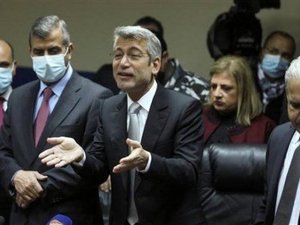Lebanon signs gas importation deal with Egypt and Syria

An agreement was signed Tuesday in Beirut for importing Egyptian natural gas to Lebanon through Syria.
"The importance of this deal... stems from the fact that it will secure an additional four hours of electricity per day following its implementation," caretaker Energy Minister Walid Fayyad said.
"We hope that after today, all hurdles will have been cleared so that we can receive World Bank funding and... final guarantees from the U.S., especially with regard to sanctions," Fayyad added.
Fayyad had said that about 650 million cubic meters of gas will be brought to Lebanon through the pipeline annually to the Deir Ammar power station in the north. He added that the amount will lead to the production of 450 megawatts of electricity adding four hours of electricity supplies a day.
"The agreement signed today crowns hard work that began nine months ago," Fayyad added.
Grappling with its worst-ever financial crisis, Lebanon launched talks with Egypt last year to import gas through the Arab Gas Pipeline, which passes through Jordan, Syria and Lebanon.
The deal is a part of wider efforts -- which include a separate electricity deal with Jordan -- to boost supply by 8 to 10 hours a day in the coming months, up from just two currently.
Implementation of both agreements still needs World Bank funding and U.S. assurances that they won't trigger sanctions under the so-called Caesar Act which prohibits commercial dealings with Damascus.
Syria stands to gain gas from Egypt as an in-kind payment for its part in the deal, but will not receive funds, Fayyad told AFP in January. The director general of Syria's General Petroleum Corp., Nabih Khrestin, said Tuesday that the deal would cover some of Lebanon's need "and we are in more need."
Two years into Lebanon's economic meltdown, the cash-strapped state is struggling to purchase fuel for its power stations.
With mains electricity effectively non-existent, many rely on private generators, but prices have increased after the government lifted fuel subsidies as global fuel prices soared.
Lebanon's crumbling electricity sector has cost the country more than $40 billion since the end of its 1975-1990 civil war.
Successive governments have failed to cut down on losses, repair crumbling infrastructure or even collect electricity bills regularly across the country.
Fayyad should get up to speed on Carbon Trade as Lebanon can rightfully earn $billions by reducing fossil energy (see Tesla balance sheet) not to mention reduce pollution and health cost. From the $45 billion wasted on EDL deficits, only $20 billion would have converted Lebanon to fully renewable energy. With EV car revolution, a $4 billion investment in Giga-battery factory, employing thousands would have gradually converted cars to EV, supplied Middle East, and in time provided backbone for energy grid stability. Tunnels financed by tolls from Beirut and Tripoli ports to Bekaa and Akar would take most trucks of roads, reduce energy and crashes, and improve port attractiveness. Monorail from Tripoli to Tyr to connect cities and reduce energy, congestion and pollution. Only $10 Billion for tunnels & monorail. Even lakes from future dams could be covered with PV panels. Still with our mountains, valleys and sea, wind turbines remain cheapest energy source. Unforgivable waste!

Whereas corporations and nations are pledging to be carbon neutral in couple of decades, Fayyad’s electricity plan is backward looking, full of corruption pitfalls, depends on Assad grace and expensive imports, and will bankrupt and pollute Lebanon. It does not mention renewable knowing well that Lebanon is blessed with solar, wind, hydro, and wave power. Is Fayyad aware of UAE Masdar contracts to generate solar power for 2.4 cents a KW or Saudi contract for solar power at 2 cents/KW? Does he understand solar is more efficient in high mountains than desert as PV negatively affected by heat? Is he aware of WDRVM, a Syrian firm producing large wind turbines (WT)? Has he considered off-shore WT near Tripoli islands, today’s cheapest form of energy? Hydro & microhydro power? benefit of distributed power and net-metering? Is he aware 20% incentive means 80% from private funds quadrupling power output? Or 4 solar panels provide 30 yrs of free 15,000 KM/year for every EV car?